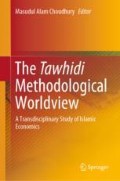Abstract
This chapter intensifies in further depth the structure of the analytical aspects of Tawhidi methodology in socio-scientific studies. The formal derivation and its conceptual extension of the sequencing of induction of unity of knowledge across various world-systems in respect of their knowledge induced events is established. Furthermore, the ultimate application of such sequences of knowledge-induced development of the Tawhidi world-system is explained. This invokes primal ontology leading to epistemology, then to phenomenology as the conscious application in the light of unity of knowledge. These three pronged states of every IIE-learning process is carried forward in continuous processes of sustainability. The extension of the intra-system formulation and application of the Tawhidi methodological worldview across conscious historicism is extended to multi-systems. Thereby, the nature of the inter-temporal evolution of multiverses of systems is formulated. Thereby, the mathematical properties of continuity, differentiability and sustainability of inter-causal relations of unity of knowledge are explained in the topological family of monotonic product functions with the same properties. The totality of such properties is explained to evaluate the wellbeing objective criterion with inter-variable circular causation relations signifying the endogenous nature of all variables under choice by the Tawhidi law of unity of knowledge arising from primal ontology. The actual empirical evaluation of the coefficients of the wellbeing function and its system of non-linear organic relations between endogenous variables is left for exclusive chapters.
Access this chapter
Tax calculation will be finalised at checkout
Purchases are for personal use only
Notes
- 1.
An example of averaging is parameterization of the ranks of each variable in terms of its induction by the rank signifying interrelationship between the variables in terms of the ranks. A ranked variable computed in a simple way, but not limited to this way of averaging is this: Assign the value 10 (say) to the best value of each of the variables, denoted by x*(θ = 10), in its column. The rest of the column parametric values are computed as, θi = (10/x*) · xi. Thereby we record the values of {xi(θi)}. Finally, the average value of {θij} is obtained across columns (i) for each row (j). The resulting parametric value is the average value of various ‘θ’s’ in the data-base.
The above parameterization method is more appropriately used for time series data. For the survey data we proceed along the following parameterization method: In the survey case, (row × column) responses of each respondent across survey questions form the Likert parametric weights. No further weighting, as in the case of time-series data is required. Averaging across responses would yield the θ-values of the data-base.
References
Auda, J. (2008). Maqasid Al-Shari’ah as philosophy of Islamic law, a systems approach. Herndo, Virginia: International Institute of Islamic Thought.
Choudhury, M. A. (forthcoming). A theory of justice in Islam. In Azid, T. (Ed.), Justice in Islam. London, UK: Routledge.
Coulson, N. J. (1984). Commercial law in the Gulf States: The Islamic legal tradition. London, England: Graham & Trotman.
Hallaq, W. B. (2005). The origins and evolution of Islamic law (p. 182). Cambridge, UK: Cambridge University Press.
Hallaq, W. (2009). Shari’a: Theory, practice, transformations. Cambridge, England: Cambridge University Press.
Hassan, H. (2002). Contracts in Islamic law: The principles of commutative justice and liberality. Journal of Islamic Studies, 13(3), 257–297.
Henderson, J. M., & Quandt, R. E. (1980). Microeconomic theory. New York: McGraw Hill, Inc.
Hogg, R. V., & Craig, A. T. (1965). Introduction to mathematical statistics. New York, NY: Macmillan Co.
Hume, D. (1988). An enquiry concerning human understanding. Buffalo: Prometheus Books.
Kamali, M. H. (2008). Shari’ah Law: an introduction. Oxford, UK: Oneworld Publication.
Kant, I. (1949). In C. J. Friedrich (Ed.), The philosophy of Kant. New York, NY: Modern Library.
Maddox, I. J. (1970). Elements of functional analysis. Cambridge, England: Cambridge University Press.
Nozick, R. (1974). Distributive justice. In Philosophy and public affairs (Vol. 3).
Rahman, T. (n.d.). Social justice in western and Islamic thought (A comparative study of John Rawls’s and Sayyid Qutb’s theories of social justice, n.d. internet version).
Rawls, J. (1971). A theory of justice. Cambridge, MA: Harvard University Press.
Author information
Authors and Affiliations
Corresponding author
Editor information
Editors and Affiliations
Rights and permissions
Copyright information
© 2019 Springer Nature Singapore Pte Ltd.
About this chapter
Cite this chapter
Choudhury, M.A. (2019). Tawhidi Structure of the Participatory World-System. In: Choudhury, M. (eds) The Tawhidi Methodological Worldview . Springer, Singapore. https://doi.org/10.1007/978-981-13-6585-0_3
Download citation
DOI: https://doi.org/10.1007/978-981-13-6585-0_3
Published:
Publisher Name: Springer, Singapore
Print ISBN: 978-981-13-6584-3
Online ISBN: 978-981-13-6585-0
eBook Packages: Economics and FinanceEconomics and Finance (R0)

